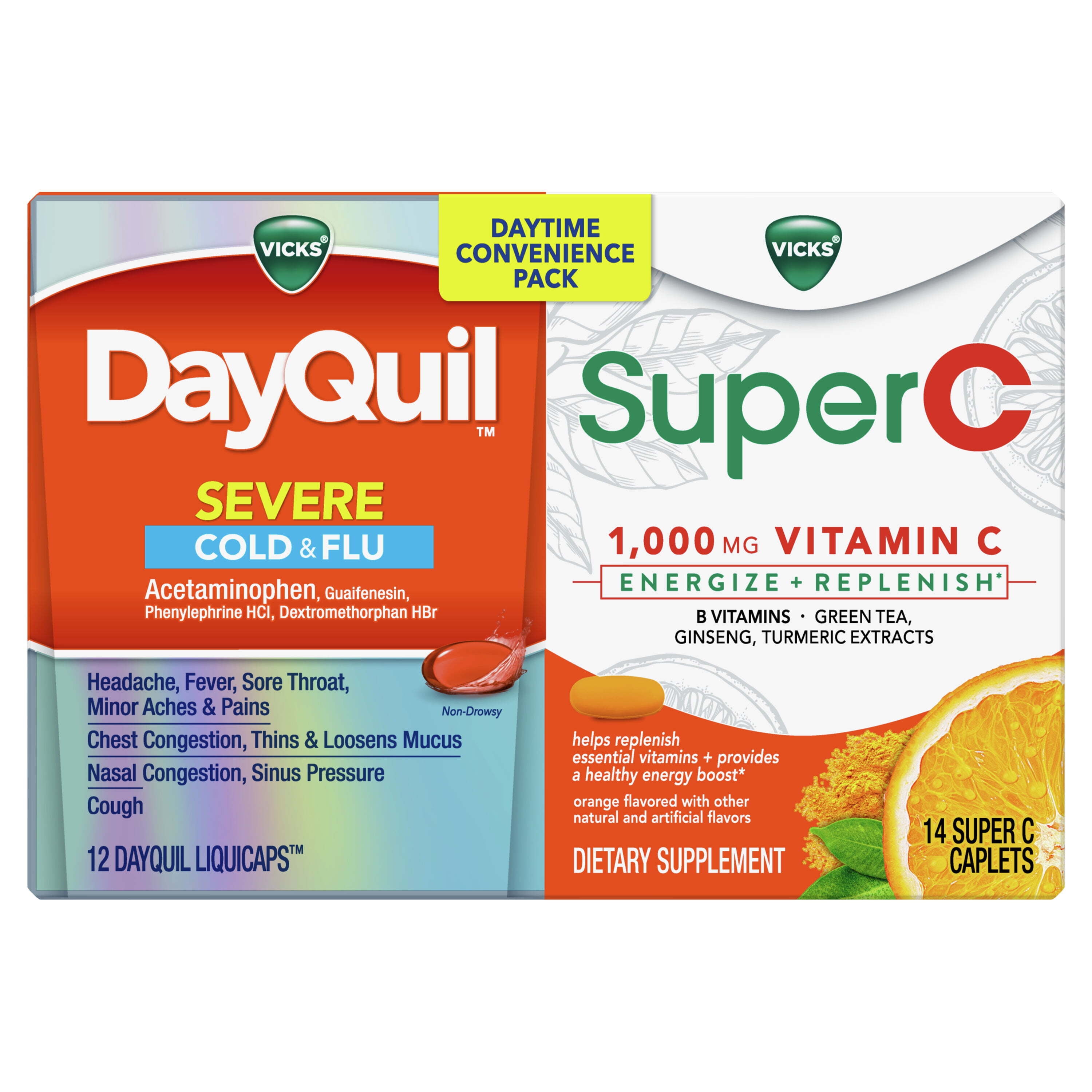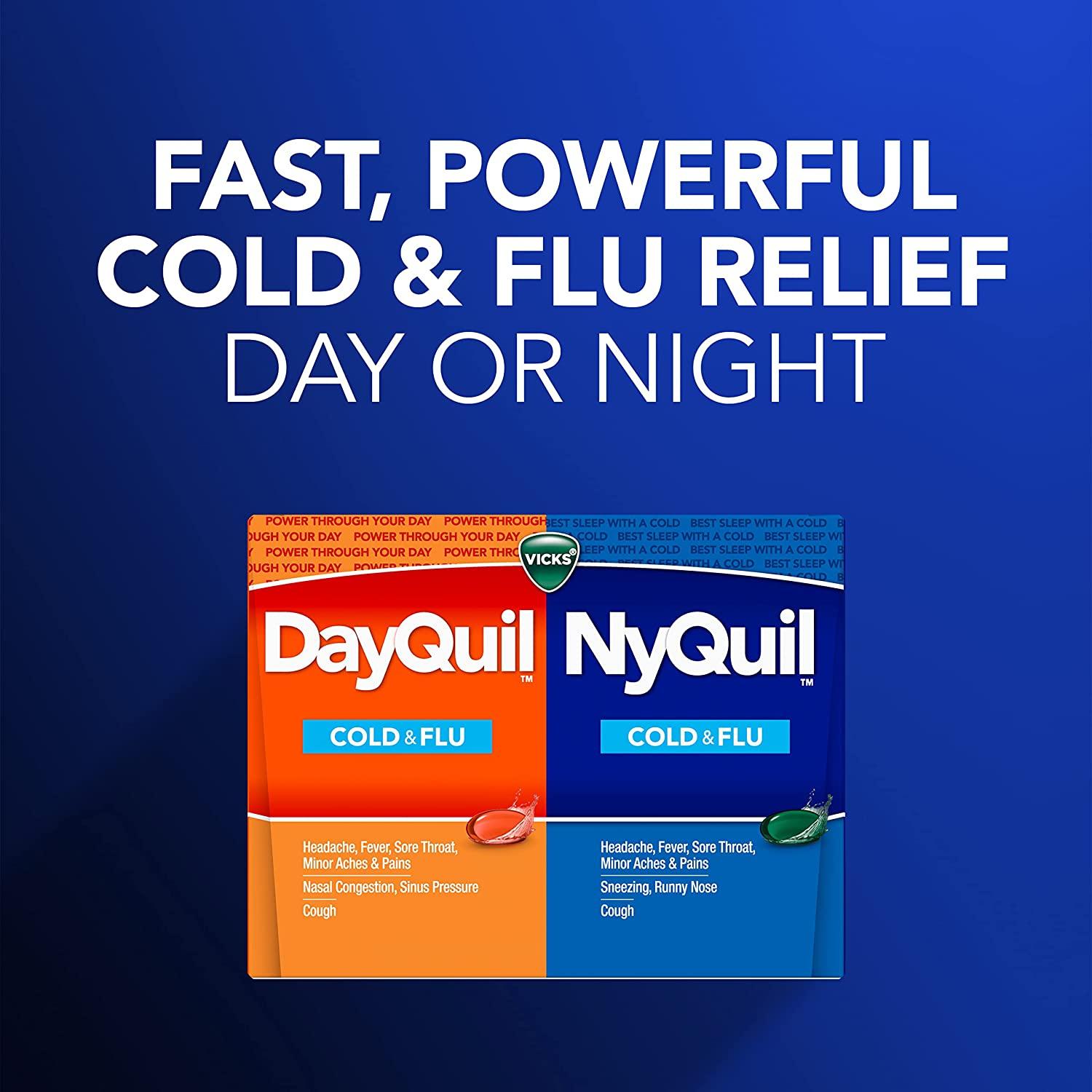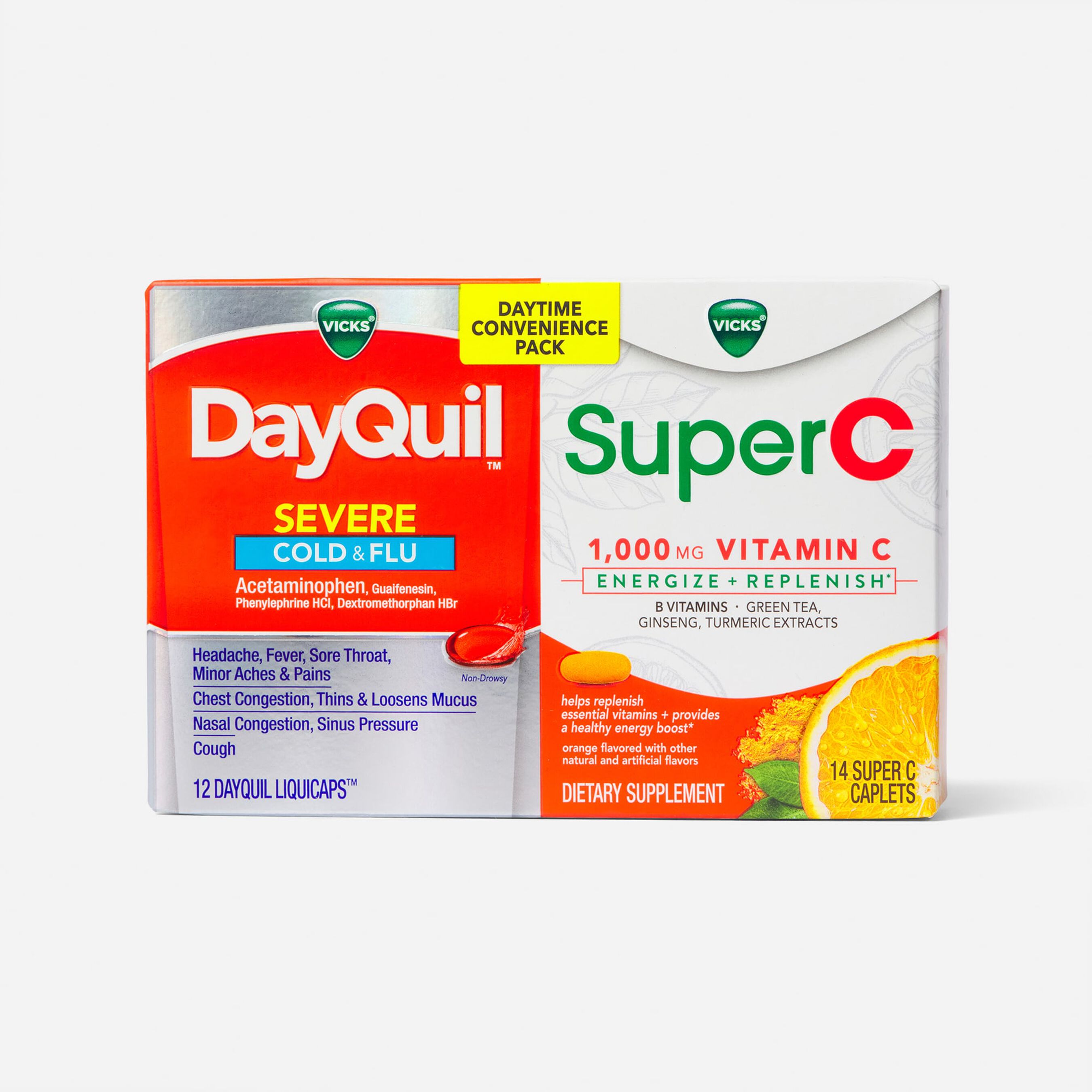Can I Take Dayquil At Night? The Ultimate Guide To Safe And Sound Sleep
Have you ever found yourself staring at the ceiling wondering, "Can I take Dayquil at night?" It's a pretty common question, especially if you're battling a cold or flu and desperate for some shut-eye. We've all been there—sniffling, coughing, and tossing and turning while trying to figure out what's safe to take when sleep feels like a distant dream. Well, buckle up because we're diving deep into the world of Dayquil, its ingredients, side effects, and whether or not it's a good idea to pop it before bed. Spoiler alert: it depends on a few things.
Dayquil is one of those over-the-counter meds that's basically a superhero when it comes to fighting off cold and flu symptoms during the day. It’s packed with ingredients that help reduce fever, relieve congestion, and ease those pesky sniffles. But here's the catch—it's specifically designed to keep you alert and active during daylight hours. So, what happens if you take it at night? Is it safe? Will it affect your sleep? Let's break it down.
This article isn’t just about answering your burning question; it’s also about empowering you with the knowledge to make informed decisions about your health. Whether you're dealing with a stubborn cold or simply curious about medication safety, we’ve got you covered. So, grab a cup of tea, get comfy, and let’s dive into everything you need to know about taking Dayquil at night.
- The Crucial Role Of Pennsylvanias Secretary Of State In Shaping State Governance
- Blues City Cafe Where Soulful Sounds Meet Exceptional Flavors
Table of Contents
- What is Dayquil?
- Key Ingredients in Dayquil
- Dayquil vs. Nyquil: What’s the Difference?
- Can You Take Dayquil at Night?
- Potential Side Effects of Taking Dayquil at Night
- Safe Alternatives for Nighttime Cold Relief
- How Dayquil Affects Sleep Quality
- Proper Dosage and Timing
- Expert Advice and Precautions
- Final Thoughts: Should You Take Dayquil at Night?
What is Dayquil?
Let’s start with the basics. Dayquil is a popular over-the-counter medication designed to combat cold and flu symptoms. It’s marketed as a daytime remedy because its formula includes stimulant-like ingredients that help you stay alert and functional even when you’re feeling under the weather. If you’ve ever taken it, you know it can be a game-changer for tackling stuffy noses, sore throats, and fevers.
Dayquil comes in various forms, including liquid, capsules, and tablets, making it convenient for people of all ages. However, its primary purpose is to help you power through the day, not drift off into dreamland. This distinction is crucial when considering whether or not it’s safe to take at night.
So, if you're wondering why Dayquil is labeled as a daytime medication, it all boils down to its active ingredients. Let’s take a closer look at what makes Dayquil tick.
- Unveiling The Luxurious Charm Of Crowne Plaza Ravinia
- Aurora Public Schools A Pillar Of Educational Excellence
Key Ingredients in Dayquil
The magic behind Dayquil lies in its active ingredients. Here's a quick rundown of what you'll typically find in a dose:
- Acetaminophen: This is the go-to ingredient for reducing fever and relieving pain. It’s also found in many other over-the-counter medications, so it’s important to keep track of how much you’re consuming in a day.
- Dextromethorphan: This is a cough suppressant that helps calm those uncontrollable coughing fits. It’s not a stimulant, but it can sometimes cause mild drowsiness in some people.
- Pseudoephedrine: This is a decongestant that helps clear up nasal passages and relieve sinus pressure. It’s also the ingredient that can leave you feeling a bit wired or restless.
These ingredients work together to provide relief from multiple cold and flu symptoms. However, the pseudoephedrine is the real kicker when it comes to nighttime use. It’s known to have a stimulating effect, which is why Dayquil is generally not recommended for bedtime.
How Do These Ingredients Affect Sleep?
While acetaminophen and dextromethorphan are relatively neutral when it comes to sleep, pseudoephedrine can interfere with your ability to relax and drift off. It’s kind of like drinking a cup of coffee right before bed—it might keep your mind racing and your body restless. That’s why it’s important to consider whether the benefits outweigh the potential downsides when taking Dayquil at night.
Dayquil vs. Nyquil: What’s the Difference?
Now, let’s talk about the elephant in the room—Nyquil. If you’re familiar with Dayquil, chances are you’ve also heard of its nighttime counterpart, Nyquil. So, what’s the difference between the two?
While both medications are designed to tackle cold and flu symptoms, they cater to different times of the day. Nyquil contains ingredients like diphenhydramine, which is a sedative that helps promote sleep. On the other hand, Dayquil is formulated to keep you alert and focused, making it less ideal for nighttime use.
Here’s a quick comparison:
- Dayquil: Stimulating ingredients like pseudoephedrine to keep you awake and active.
- Nyquil: Sedative ingredients like diphenhydramine to help you relax and sleep.
So, if you’re debating between the two, it’s pretty clear which one is better suited for nighttime use. But what if you don’t have Nyquil on hand and you’re stuck with Dayquil? Let’s explore that scenario next.
Can You Take Dayquil at Night?
Here’s the million-dollar question—can you take Dayquil at night? The short answer is yes, but with some caveats. While it’s technically safe to take Dayquil in the evening, it may not be the best choice if you’re looking for a restful night’s sleep. The stimulating effects of pseudoephedrine can make it harder to fall asleep and stay asleep.
That said, there are a few scenarios where taking Dayquil at night might be acceptable:
- If you’re only experiencing mild symptoms and don’t need a sedative to sleep.
- If you’ve taken it earlier in the evening and it’s close to wearing off.
- If you have no other options and are desperate for relief.
However, it’s important to weigh the pros and cons before making a decision. If you’re already struggling with sleep issues, adding a stimulant to the mix might not be the best idea.
Factors to Consider
When deciding whether to take Dayquil at night, consider the following:
- Severity of Symptoms: Are your symptoms severe enough to warrant medication at night?
- Sleep Schedule: How important is a good night’s sleep for your overall well-being?
- Alternative Options: Are there other medications or remedies that might work better for nighttime use?
Ultimately, the decision comes down to your individual needs and circumstances. If you’re unsure, it’s always a good idea to consult with a healthcare professional.
Potential Side Effects of Taking Dayquil at Night
While Dayquil is generally safe when used as directed, taking it at night can lead to some unwanted side effects. Here are a few to watch out for:
- Insomnia: The stimulating effects of pseudoephedrine can make it difficult to fall asleep.
- Restlessness: You might find yourself tossing and turning more than usual.
- Increased Heart Rate: Some people experience a faster heartbeat after taking Dayquil, which can be unsettling at night.
- Dry Mouth: This is a common side effect of many cold medications and can make it harder to sleep comfortably.
It’s worth noting that not everyone will experience these side effects. Some people might tolerate Dayquil well at night, while others might find it disruptive. If you notice any adverse reactions, it’s best to stop taking the medication and seek alternative solutions.
How to Minimize Side Effects
If you decide to take Dayquil at night, here are a few tips to minimize potential side effects:
- Take It Earlier: Try taking it a few hours before bed to give your body time to metabolize the medication.
- Stay Hydrated: Drink plenty of water to counteract dry mouth and keep your throat moist.
- Practice Relaxation Techniques: Engage in calming activities like reading or meditating to help you wind down.
By taking these precautions, you can increase your chances of getting a decent night’s sleep even while using Dayquil.
Safe Alternatives for Nighttime Cold Relief
If Dayquil isn’t the best option for nighttime use, what are some safe alternatives? Fortunately, there are plenty of other remedies that can help you sleep soundly while relieving cold and flu symptoms. Here are a few to consider:
- Nyquil: As mentioned earlier, Nyquil is specifically designed for nighttime use and contains sedative ingredients to help you relax.
- Herbal Teas: Chamomile, peppermint, and ginger teas are natural remedies that can soothe a sore throat and promote relaxation.
- Honey and Lemon: This classic combo is a great way to ease coughing and reduce inflammation in the throat.
- Humidifiers: Adding moisture to the air can help alleviate congestion and make breathing easier at night.
These alternatives are not only effective but also gentle on your system, making them ideal for nighttime use.
When to See a Doctor
If your symptoms persist or worsen despite trying over-the-counter remedies, it might be time to see a doctor. Persistent colds or flu can sometimes lead to complications like sinus infections or bronchitis, so it’s important to seek professional advice if needed.
How Dayquil Affects Sleep Quality
Now, let’s talk about the bigger picture—how does Dayquil affect your overall sleep quality? Sleep is crucial for recovery, especially when you’re battling a cold or flu. If a medication interferes with your ability to get restful sleep, it can prolong your recovery time and leave you feeling even more run-down.
Studies have shown that disrupted sleep patterns can weaken the immune system, making it harder for your body to fight off infections. So, while Dayquil might provide temporary relief from symptoms, it’s important to consider the long-term effects on your sleep and overall health.
That’s why it’s often recommended to reserve Dayquil for daytime use and opt for nighttime-specific remedies when possible. By prioritizing sleep, you can give your body the rest it needs to heal.
Proper Dosage and Timing
When it comes to taking Dayquil, following the recommended dosage and timing is crucial. Here are a few guidelines to keep in mind:
- Read the Label: Always check the packaging for specific instructions on dosage and frequency.
- Don’t Overdo It: Taking more than the recommended dose can lead to serious side effects and even overdose.
- Space Out Doses: Allow enough time between doses to avoid overwhelming your system.
If you’re taking Dayquil at night, it’s especially important to be mindful of the timing. Taking it too close to bedtime might leave you feeling wired and restless. Aim to take it a few hours before bed to give your body time to process the medication.
Consulting a Healthcare Professional
If you’re unsure about the proper dosage or timing, don’t hesitate to consult a healthcare professional. They can provide personalized advice based on your specific needs and medical history. Remember, your health is worth the extra effort.
Expert Advice and Precautions
Before we wrap up, let’s touch on some expert advice and precautions to keep in mind when taking Dayquil at night:
- Join The Violent Femmes Tour 2023 Where Energy Meets Melody
- Discover The Ultimate Comfort And Convenience At Best Western Plus Park Place Inn Mini Suites

DayQuil Severe Liquicaps Medicine and Super C Daily Supplement Tablet

Vicks DayQuil NyQuil LiquiCaps 72 Count Cold & Flu Relief Capsules

Vicks DayQuil Severe Cold & Flu LiquiCaps and Super C Convenience Pack